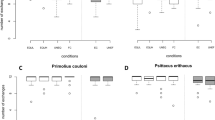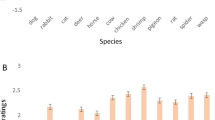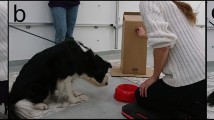Abstract
Brosnan and de Waal1 have shown that capuchin monkeys are more likely to reject a cucumber slice after seeing that another capuchin has received a more attractive grape. In interpreting this finding, the authors make a link to work in humans on ‘inequity aversion’ and suggest that capuchins, like humans, may reject rewards because they are averse to unequal pay-offs. Here I argue that this interpretation suffers from three problems: the results contradict the predictions of the inequity-aversion model that Bosnan and de Waal cite2; experimental results indicate that humans do not behave like capuchins in similar circumstances; and the available evidence does not suggest that inequity aversion is cross-culturally universal3,4,5.
Similar content being viewed by others
Main
I consider these points in turn. Brosnan and de Waal link their findings to work showing that a wide range of experimental behaviour in humans can be understood by introducing a preference for equity into the standard self-interested utility function. The effect of introducing this non-selfish preference is to cause individuals — under certain circumstances — to give up some of their pay-off in order to decrease the gains of other individuals.
Applying the Fehr–Schmidt inequity-aversion model2 cited by Brosnan and de Waal to the capuchin experimental situation predicts that capuchins should always eat the cucumber. It does not predict that inequity-averse individuals will reject the food reward, which is what the monkeys did. Rejecting the cucumber increases, not decreases, inequality. Moreover, the grape-receiving capuchins sometimes reached through the cage and stole their partner's discarded cucumber, exacerbating the inequality.
Consistent with inequity aversion in humans, the results from experimental variations of the ultimatum game suggest that humans would not reject a reward unless that rejection reduced the take of the individual who received more. In the ultimatum game, two players are allotted a sum of money to divide. The first player — the ‘proposer’ — must offer a portion of the sum to the second player — the ‘responder’ — who must then decide whether to ‘accept’ or ‘reject’ the offer. If the responder accepts, he gets the amount of the offer and the proposer receives the remainder. If he rejects, both players get zero. The game is played once, and players never learn their partner's identity. Inequity aversion can explain the willingness of responders to reject low offers (in contrast, pure self-interest predicts that responders will never reject any non-zero offer). Once some responders are willing to reject low offers, self-interest guarantees that proposers will raise their offers.
Two kinds of variation from the standard ultimatum game suggest that humans, unlike capuchins, would not reject in Brosnan and de Waal's experimental context. Two versions of a reduced-form ultimatum game have been compared6: the first was a standard game, except that proposers had only two choices, an equitable allocation or a highly inequitable one; and the second (the ‘impunity game’) was identical, except that if the responder rejected his offer, the proposer's pay-off remained unchanged (but the responder received zero). In the first version, players were willing to reject inequitable allocations, whereas in the second version (which parallels the capuchin situation), subjects never rejected.
Similar evidence comes from multi-lateral ultimatum games in which one proposer faces multiple responders (see U. Fischbacher, C. M. Fong & E. Fehr, http://www.iew.unizh.ch/wp/iewwp133.pdf). In this set-up, as long as one of the responders accepts the offer, the proposer gets his pay-off. As before, the responder's ability to affect the proposer's pay-off by rejecting is mitigated by the other responders who might accept. As predicted by inequity aversion, responders decrease their willingness to reject, and proposers drop their offers accordingly. Therefore, although both of these experimental patterns are consistent with inequity aversion, both also seem to be at odds with Brosnan and de Waal's capuchin findings: that is, they show that humans will not reject unless this affects the other's pay-off.
Brosnan and de Waal also suggest that inequity aversion is probably a human universal, and they cite work that uses the ultimatum game in 15 small-scale societies3,4,5. If responder behaviour (willingness to reject low offers) is taken as the most direct measure of inequity aversion, then our results do not support the universal claim. Although five societies do show evidence consistent with inequity aversion, three others show evidence of trivially little or no inequity aversion. The remainder have so few low offers that no substantial claims can be made.
References
Brosnan, S. & de Waal, F. B. M. Nature 425, 297–299 (2003).
Fehr, E. & Schmidt, K. M. Q. J. Econ. 114, 817–868 (1999).
Henrich, J. et al. (eds) Foundations of Human Sociality: Economic Experiments and Ethnographic Evidence from 15 Small-Scale Societies (Oxford University Press, New York, in the press).
Henrich, J. Am. Econ. Rev. 90, 973–980 (2000).
Henrich, J. et al. Am. Econ. Rev. 91, 73–78 (2001).
Bolton, G. E. & Zwick, R. Games Econ. Behav. 10, 95–121 (1995).
Author information
Authors and Affiliations
Corresponding author
Rights and permissions
About this article
Cite this article
Henrich, J. Inequity aversion in capuchins?. Nature 428, 139 (2004). https://doi.org/10.1038/428139a
Issue Date:
DOI: https://doi.org/10.1038/428139a
This article is cited by
-
Negative Behavioral Contrast in Capuchin Monkeys (Sapajus sp.)
The Psychological Record (2021)
-
Scaling reward value with demand curves versus preference tests
Animal Cognition (2016)
-
Does effort influence inequity aversion in cotton-top tamarins (Saguinus oedipus)?
Animal Cognition (2014)
-
Social comparison mediates chimpanzees’ responses to loss, not frustration
Animal Cognition (2014)
-
Inequity aversion in human adults: testing behavioural criteria from comparative cognition
Animal Cognition (2013)
Comments
By submitting a comment you agree to abide by our Terms and Community Guidelines. If you find something abusive or that does not comply with our terms or guidelines please flag it as inappropriate.



